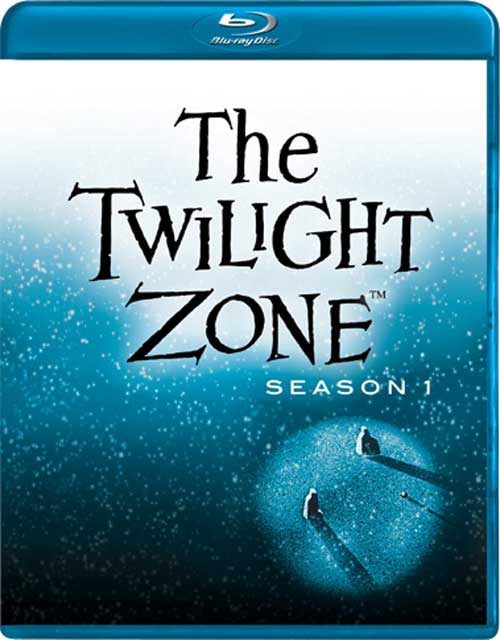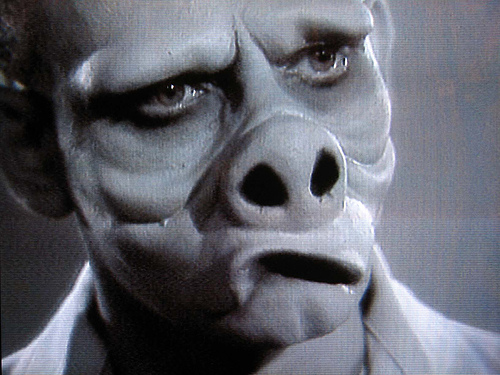
Today, an otherwise mundane Tuesday in  September, is a momentous day for fans of science fiction. Why? Because The Twilight Zone: Season 1 is now available on Blu-ray. And it is a glorious set to behold.
September, is a momentous day for fans of science fiction. Why? Because The Twilight Zone: Season 1 is now available on Blu-ray. And it is a glorious set to behold.
I could ramble on about how pristine the new high-definition transfer is (recordings that are over 40 years old should not look this good, yet somehow each episode has been immaculately conserved and eased into HD) or how the meticulous folks at Image Entertainment packed this set with a sinful amount of special features (it has some 19 new commentaries, a host of period-specific footage about the success of the show, the unaired pilot, and a whole lot more), but instead of just reviewing the Blu-ray, I’d rather take a closer look at what I feel is the lasting legacy of The Twilight Zone: the writing.
Sure, The Twilight Zone’s anthology format (which it popularized but certainly didn’t pioneer) influenced a host of similar shows, the most obvious being The Outer Limits, and eventually films as well, but the format would have been nothing without its outstanding staff of writers. Series creator Rod Serling wrote the bulk of the show’s episodes, but he’s never had any qualms about giving credit to the people who most influenced him. Old science fiction masters along the lines of Robert Heinlein, Isaac Asimov, Theodore Sturgeon, Richard Matheson and Ray Bradbury all had their hand – some more directly than others – in cultivating the kind of stories that Serling liked to tell. And it’s those specific kind of stories that would go on to define the series.
We’ve all heard the phrase “It’s like a Twilight Zone episode,” but what does that really mean? Because the show’s more memorable episodes – ones like “Time Enough at Last,” about a man who only wants to spend his life reading books, and “The Eye of the Beholder,” about a freak-of-nature woman who is undergoing plastic surgery to look more like everyone else around her – all featured a last-minute surprise, the comparison is often made whenever something even vaguely sci-fi has a twist ending. Such a comparison is selling the show short, though. The Twilight Zone wasn’t about writing for a twist; it was about exploring how mankind’s latent nature will inherently always get it in trouble.
Unlike a number of science fiction properties, be them books or movies, The Twilight Zone didn’t have a grudge against actual science. Its stories weren’t about how investigating new frontiers or pushing the limits of human knowledge will bring about the end of the human race. No, Serling’s goal was always to tell stories about man becoming undone as a result of his own insecurities – not because he was meddling in things he shouldn’t have – which is why he always turned to source material that was more speculation than condemnation.
 Obviously there are a variety of science fiction stories, but the most common to film and television is the foreboding warning to mankind that its ignorance about that which it experiments on will get it killed. That’s not the most common species to The Twilight Zone, however. The Twilight Zone was predominantly about mankind’s own lack of restraint, about the toxicity of the me-first mindset. And that particular strain of sci-fi is sadly becoming extinct.
Obviously there are a variety of science fiction stories, but the most common to film and television is the foreboding warning to mankind that its ignorance about that which it experiments on will get it killed. That’s not the most common species to The Twilight Zone, however. The Twilight Zone was predominantly about mankind’s own lack of restraint, about the toxicity of the me-first mindset. And that particular strain of sci-fi is sadly becoming extinct.
Doom-and-gloom scenarios are all the rage these days, which is a natural reflection of our nation falling out of love with science. It’s no longer valued and revered the same way it was when The Twilight Zone was still alive, and that is due in no small part to the fact that the literary science fiction masters are no longer the rock stars they used to be. People like Matheson, Bradbury and Serling are no longer welcome in our fiction. And it’s not just TV or movies but magazines as well – one would be amazed how many Twilight Zone episodes were adapted from short stories that were initially published in Playboy. Sure, every now and then Hollywood reaches back to its collected works to pull out something for modernization, but the modernization always ends up being a complete cannibalization of the soul of the original story.
Big-budget films like I Am Legend and The Day the Earth Stood Still have become all about the spectacle. All studios care about now are scenarios, not stories. They want to reanimate the skeleton, not the body and mind, and the result is invariably a pale wraith of what once was. Hey! Man’s greed getting in the way of the goal? That sounds like the end of a Twilight Zone episode…


